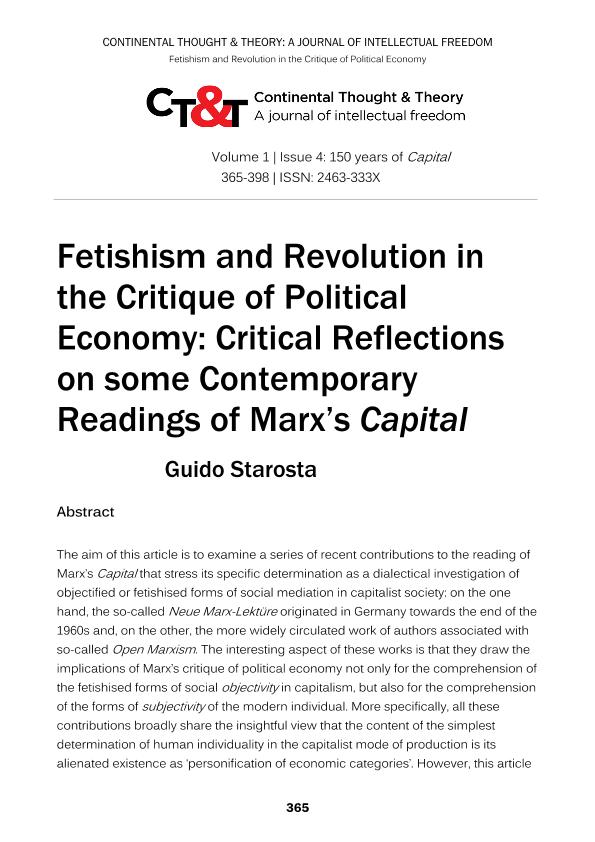Mostrar el registro sencillo del ítem
dc.contributor.author
Starosta, Guido

dc.date.available
2019-04-26T15:48:02Z
dc.date.issued
2017-10
dc.identifier.citation
Starosta, Guido; Fetishism and Revolution in the Critique of Political Economy: Critical Reflections on some Contemporary Readings of Marx’s Capital; University of Canterbury; Continental Thought & Theory; 1; 4; 10-2017; 365-398
dc.identifier.issn
2463-333X
dc.identifier.uri
http://hdl.handle.net/11336/75062
dc.description.abstract
The aim of this article is to examine a series of recent contributions to the reading of Marx’s Capital that stress its specific determination as a dialectical investigation of objectified or fetishised forms of social mediation in capitalist society: on the one hand, the so-called Neue Marx-Lektüre originated in Germany towards the end of the 1960s and, on the other, the more widely circulated work of authors associated with so-called Open Marxism. The interesting aspect of these works is that they draw the implications of Marx’s critique of political economy not only for the comprehension of the fetishised forms of social objectivity in capitalism, but also for the comprehension of the forms of subjectivity of the modern individual. More specifically, all these contributions broadly share the insightful view that the content of the simplest determination of human individuality in the capitalist mode of production is its alienated existence as ‘personification of economic categories’. However, this article argues that the limits of these perspectives become apparent when it comes to uncovering the grounds of the revolutionary form of subjectivity which carries the potentiality to transcend capitalist alienation. For these perspectives fail to ground the revolutionary form of subjectivity in the immanent unfolding of capitalist forms of social mediation. In the case of the Neue Marx-Lektüre, it quite simply leaves the problematique of the revolutionary subject outside the scope of the critique of political economy. In the case of Open Marxism, despite valiant attempts at overcoming all exteriority in their conceptualisation of the relationship between human subjectivity and capital, they end up grounding the revolutionary transformative powers of the working class outside the latter’s alienated existence as personification of economic categories; more specifically, in an abstract humanity lacking in social determinations. In contrast to these perspectives, this paper develops an alternative approach to the Marxian critique of political economy which provides an account of the revolutionary potentialities of the working class as immanent in its full determination as an attribute of the alienated or fetishised movement of the capital-form
dc.format
application/pdf
dc.language.iso
eng
dc.publisher
University of Canterbury
dc.rights
info:eu-repo/semantics/openAccess
dc.rights.uri
https://creativecommons.org/licenses/by-nc-sa/2.5/ar/
dc.subject
Capital
dc.subject
Fetishism
dc.subject
Revolution
dc.subject
Dialectics
dc.subject.classification
Economía, Econometría

dc.subject.classification
Economía y Negocios

dc.subject.classification
CIENCIAS SOCIALES

dc.title
Fetishism and Revolution in the Critique of Political Economy: Critical Reflections on some Contemporary Readings of Marx’s Capital
dc.type
info:eu-repo/semantics/article
dc.type
info:ar-repo/semantics/artículo
dc.type
info:eu-repo/semantics/publishedVersion
dc.date.updated
2019-04-25T14:03:12Z
dc.journal.volume
1
dc.journal.number
4
dc.journal.pagination
365-398
dc.journal.pais
Nueva Zelanda

dc.journal.ciudad
Canterbury
dc.description.fil
Fil: Starosta, Guido. Consejo Nacional de Investigaciones Científicas y Técnicas; Argentina. Universidad Nacional de Quilmes. Departamento de Economía y Administración; Argentina
dc.journal.title
Continental Thought & Theory
dc.relation.alternativeid
info:eu-repo/semantics/altIdentifier/url/ir.canterbury.ac.nz/bitstream/handle/10092/14496/15%20STAROSTA%20CAPITAL.pdf
Archivos asociados
